Trust our experts
Our Top Recommendations
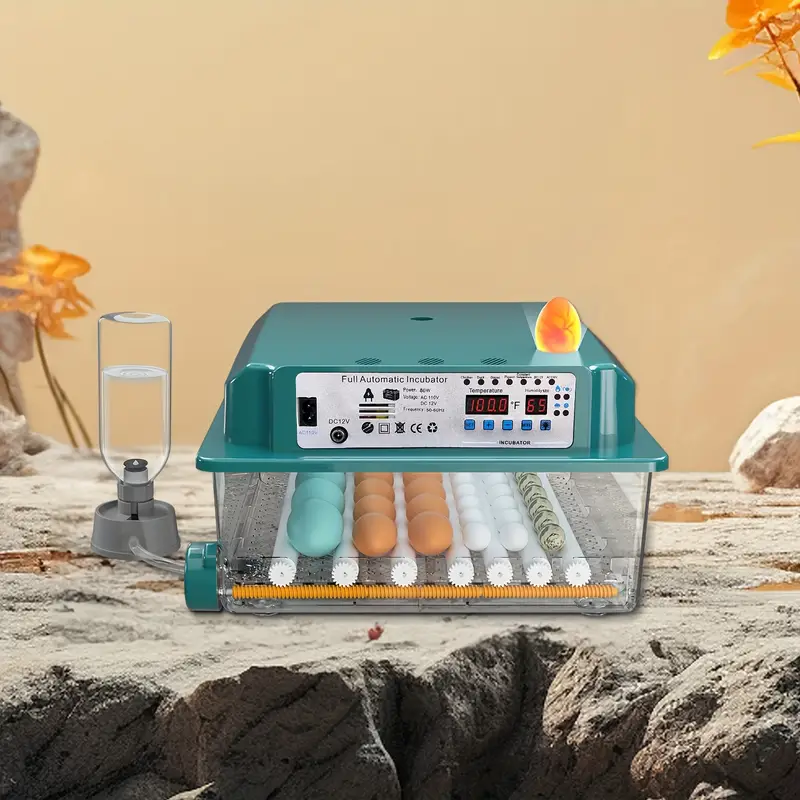
Automatic Egg Incubator with Humidity Monitoring
The Hethya 36-Egg Incubator stands out as my top choice for egg incubation. It features automatic egg turning and precise humidity monitoring, ensuring optimal conditions for hatching various egg types, including chicken, duck, quail, goose, and pigeon eggs. The incubator’s capacity to hold up to 36 eggs makes it suitable for both beginners and experienced users. Its user-friendly design and consistent performance have made it a favorite among poultry enthusiasts.
Highlighted Features
Discover the standout benefits that set our incubator apart

Automatic Temperature Control
Our incubator keeps a constant 99.5°F for optimal hatching, thanks to its built-in thermostat and responsive temperature sensor.

Adjustable Humidity System
Easily set the humidity between 40–60% RH to accommodate different egg types—essential for a successful incubation process.

Clear Viewing Window
A transparent window paired with interior LED lighting lets you monitor progress without disturbing the eggs.

Automatic Egg Turner
Eggs are gently rotated 180° every hour, mimicking natural nesting to ensure even hatching.

Strong Circulation Fan
A powerful fan provides continuous fresh air circulation, promoting a healthy environment for your chicks.

Easy-to-Clean Design
Featuring a removable wire mesh tray and durable ABS plastic construction, cleaning between hatches is a breeze.
How to choose an egg incubator
1. Determine Your Hatching Goals
Species and Egg Size: Different birds require specific incubation conditions. Ensure the incubator accommodates the egg size and species you intend to hatch.
Batch Size: Decide how many eggs you plan to incubate at once. Incubators vary in capacity, from small units holding a few eggs to larger ones accommodating dozens.
2. Key Features to Consider
Temperature Control: Accurate temperature regulation is vital. Opt for incubators with automated temperature settings to maintain consistency.
Humidity Control: Proper humidity levels are essential for embryo development. Choose models with reliable humidity monitoring and adjustment capabilities.
Egg Turning Mechanism: Regular turning prevents embryos from sticking to the shell. Automatic turners reduce manual intervention and improve hatch rates.
Ventilation: Adequate airflow ensures oxygen supply and removes carbon dioxide. Ensure the incubator has adjustable ventilation.
3. Types of Incubators
Still Air Incubators: Lack fans; temperature can vary within the unit. Suitable for small-scale hatching but may require careful monitoring.
Forced Air Incubators: Equipped with fans to distribute heat evenly, leading to more consistent hatching results.
4. Budget and Quality
Entry-Level Models: Affordable but may lack advanced features like automatic turning or precise humidity control. Suitable for beginners or small projects.
Mid-Range Models: Offer a balance between cost and functionality, often including automated features and better build quality.
High-End Models: Designed for serious breeders, these incubators provide advanced controls, higher capacities, and robust construction.
5. User Experience and Reviews
Research Feedback: Look for reviews from other users to gauge reliability and performance.
Ease of Use: Consider models with intuitive controls and clear instructions, especially if you’re new to incubation.
6. Additional Considerations
Power Source: Ensure compatibility with your local power supply and consider backup options in case of outages.
Cleaning and Maintenance: Choose designs that are easy to clean to maintain hygiene and prevent disease.
By evaluating these factors, you can select an egg incubator that aligns with your needs and increases your chances of a successful hatch.
Best Egg Incubator Reviews
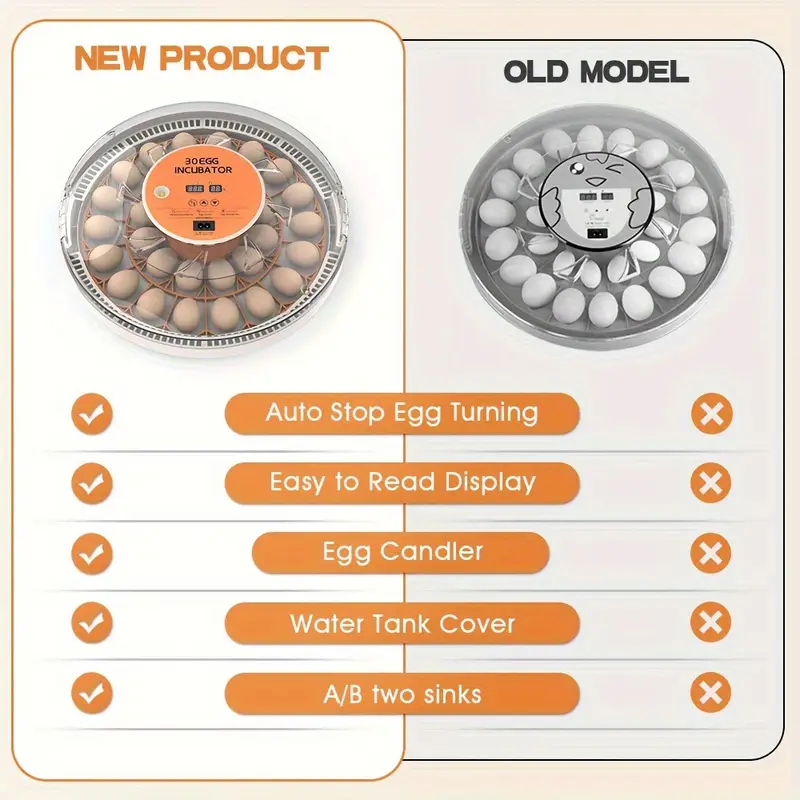
30-Egg Incubator with Automatic Egg Turner and Humidity Control
- Capacity: Holds up to 30 eggs.
- Features: Automatic egg turning, humidity control, suitable for duck, pigeon, bird, quail eggs.
- Design: Equipped with a US plug (110-130V).
- Pros: Versatile for multiple egg types; built-in humidity control aids in successful hatching.
- Cons: Lacks detailed information on temperature regulation and user reviews.
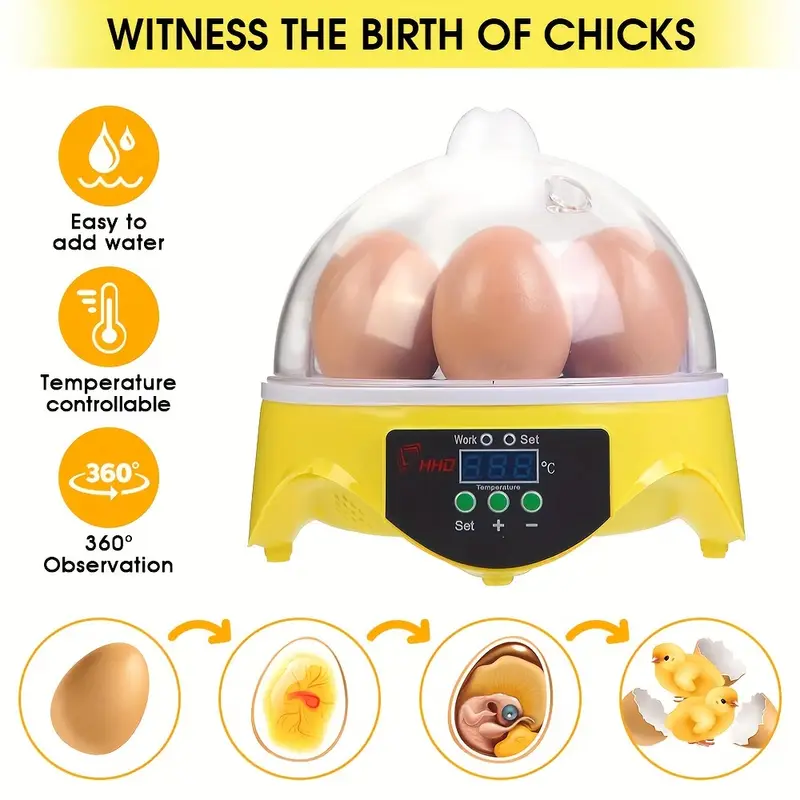
Automatic 7-Egg Incubator with Digital Temperature Control
- Capacity: Holds up to 7 eggs.
- Features: Digital temperature control, suitable for chicken, duck, turtle, and bird eggs; no battery required.
- Design: Operates with a 110-130V AC power supply.
- Pros: Compact size ideal for small-scale hatching; user-friendly digital controls.
- Cons: Limited capacity may not meet larger hatching needs.
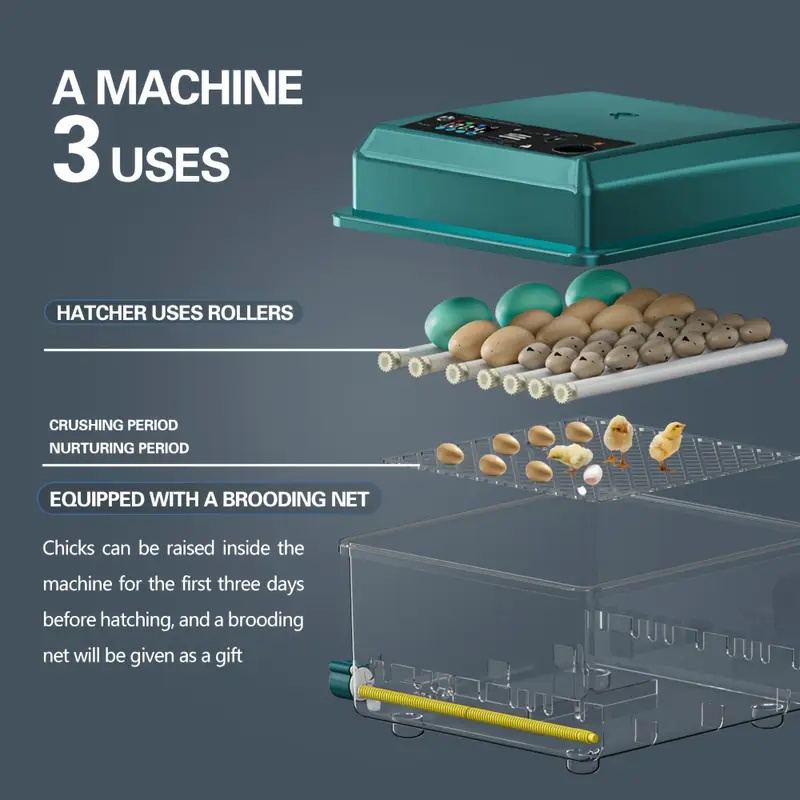
Automatic 16-Egg Incubator with Auto-Turn and Humidity Control
- Capacity: Holds up to 16 eggs.
- Features: Auto egg turning, adjustable humidity control, suitable for various egg sizes; includes heat system and light for egg inspection.
- Design: Powered by a 110V US plug.
- Pros: Comprehensive features support diverse hatching requirements.
- Cons: Specific details on temperature regulation and user experiences are limited.
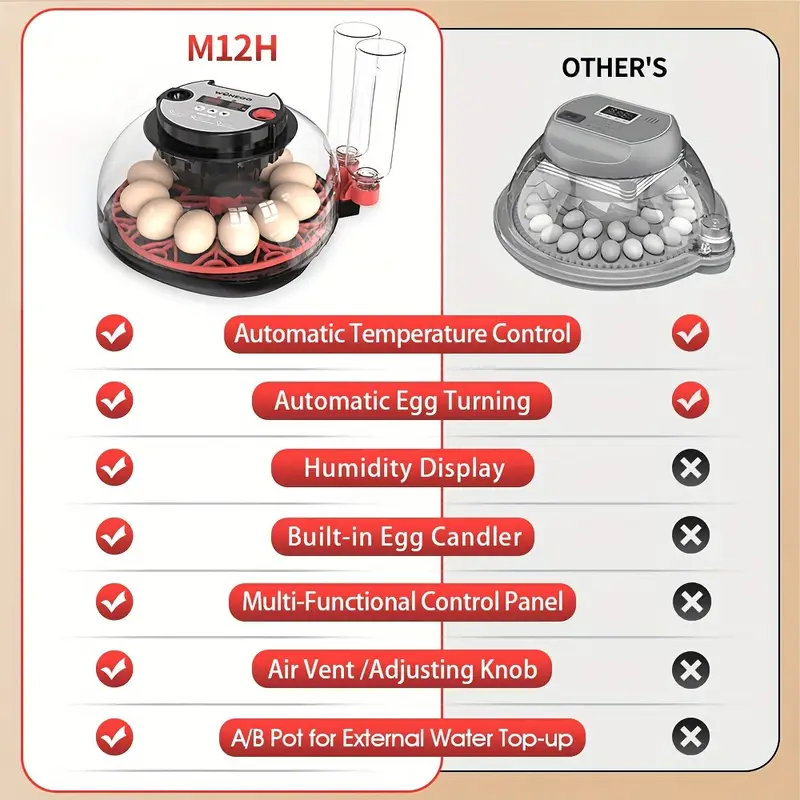
Automatic Egg Turner Incubator with 12-Egg Capacity
- Capacity: Holds up to 12 eggs.
- Features: Temperature control display; suitable for poultry, duck, quail eggs.
- Design: Operates with a 110V-130V power supply.
- Pros: Compact design suitable for limited spaces; basic temperature control.
- Cons: Absence of humidity control may affect hatch rates.
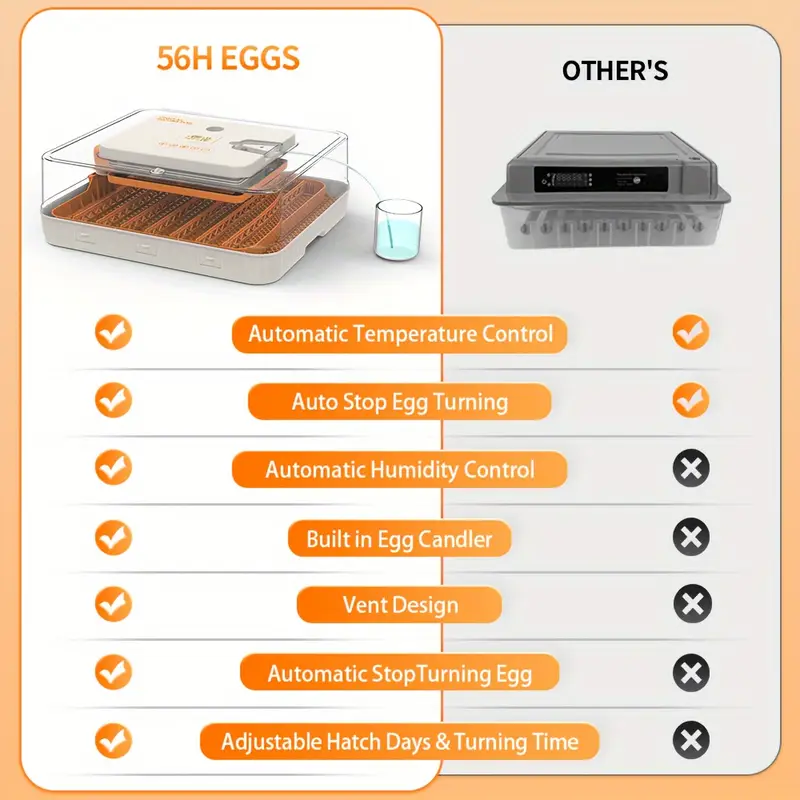
56-Egg Capacity Smart Automatic Incubator with LED Light
- Capacity: Holds up to 56 eggs.
- Features: Detachable design, temperature control, LED lighting; suitable for chicks, geese, ducks, pigeons.
- Design: Specifics on power supply and dimensions are not provided.
- Pros: Large capacity caters to substantial hatching needs; versatile design.
- Cons: Limited information on humidity control and user reviews.
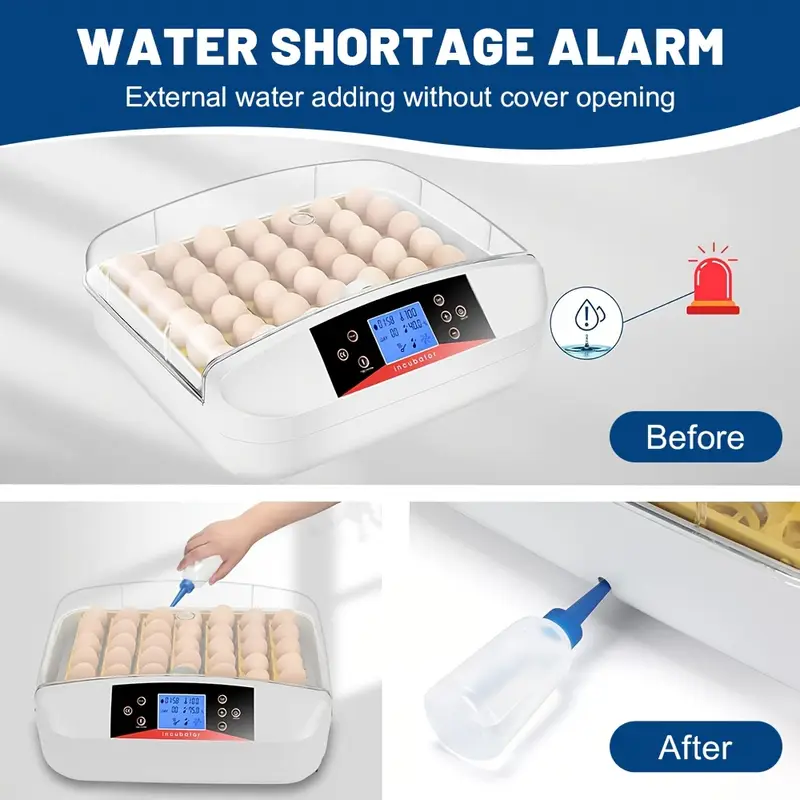
42-Egg Automatic Egg Incubator with Digital Temperature Control
- Capacity: Holds up to 42 eggs.
- Features: Digital temperature control; suitable for chicken, duck, goose, quail, parrot hatching.
- Design: Made from ABS plastic; power specifications are not detailed.
- Pros: Large capacity supports extensive hatching projects.
- Cons: Lack of humidity control and detailed user feedback.
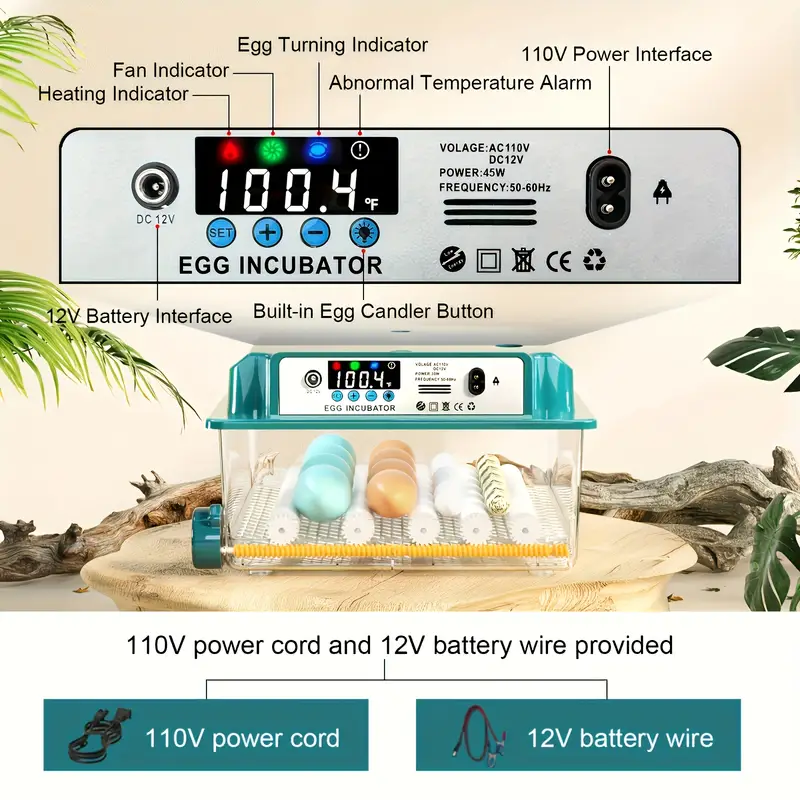
16-Egg Automatic Incubator with LED Display
- Capacity: Holds up to 16 eggs.
- Features: Humidity and temperature control, auto-rotating; ideal for chicken, duck, parrot eggs.
- Design: Specifics on power supply and dimensions are not provided.
- Pros: Integrated controls simplify the hatching process.
- Cons: Absence of detailed user reviews and information on additional features.
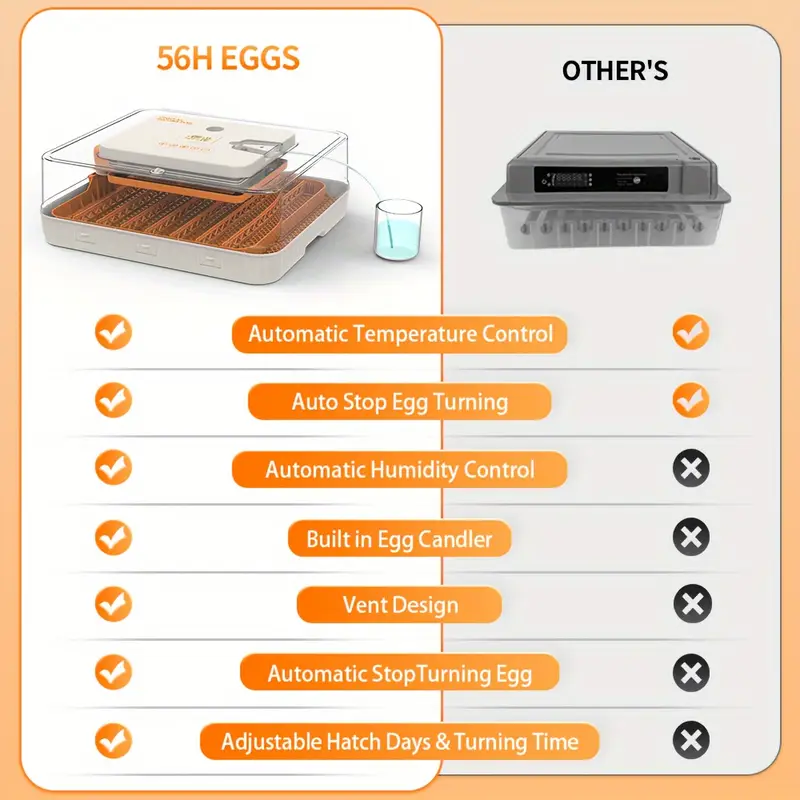
Wonegg Smart Automatic Egg Incubator
- Capacity: Holds up to 56 eggs.
- Features: Automatic egg turning, temperature control, LED lighting, detachable design for easy cleaning and maintenance; suitable for hatching chicks, geese, ducks, and pigeons.
- Design: Equipped with a 110-130V US plug, designed for indoor use.
- Pros: High capacity suitable for larger hatching needs; versatile design accommodating various bird species; user-friendly with temperature regulation and LED lighting.
- Cons: larger size may require more space.
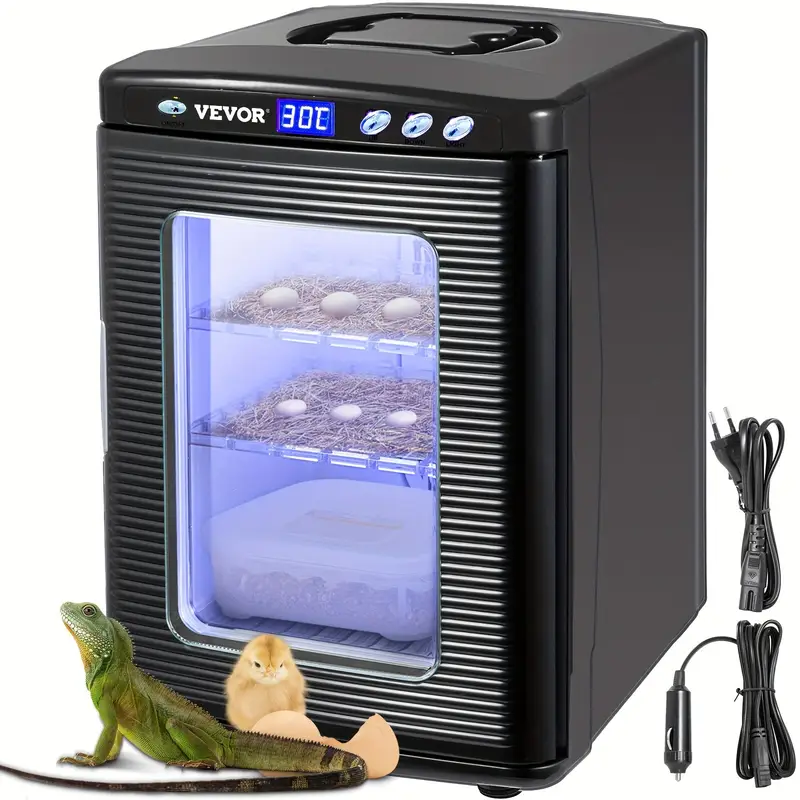
Reptile Incubator with LED Cooling and Heating
- Capacity: 25L capacity with 2 shelves
- Features: LED digital display, cooling and heating functions, designed for reptile eggs; dimensions are 13″ x 15″ x 19″; black greenhouse design.
- Pros: Adjustable temperature settings suitable for various reptile eggs; LED display allows precise monitoring.
- Cons: Lacks detailed information on humidity control and user reviews; primarily designed for reptile eggs, limiting versatility for poultry eggs.
What Customers Say


